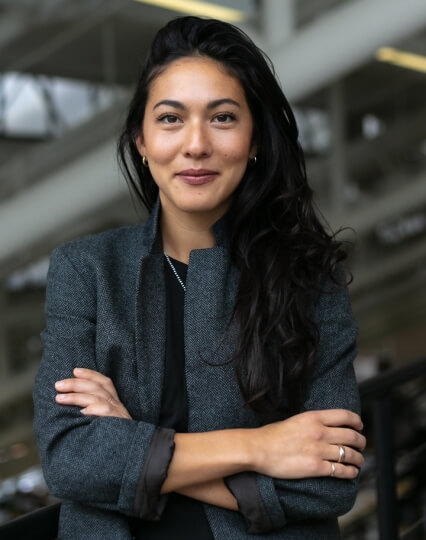Mimi Kigawa, MDE '23
When her mother got sick during the COVID-19 pandemic, Mimi Kigawa had to take a year off from the Master in Design Engineering (MDE) program, which is co-run by the Harvard John A. Paulson School of Engineering and Applied Sciences (SEAS) and Harvard Graduate School of Design. Her mother was born with chronic obstructive pulmonary disease (COPD), and the added challenges of COVID-19 meant Kigawa had to pause her coursework to care for her. And because of MDE projects she’d already undertaken, Kigawa spent a lot of time thinking about how more data can positively impact home rehabilitation and healthcare.
“It became much more real for me when these things started happening with my mom,” said Kigawa, MDE ‘23.
Once she returned to the program, caring for her mother inspired Kigawa to found Zeph, a healthcare start-up that helps COPD patients track their symptoms and rehab progress at home. Zeph’s platform offers a range of education modules, exercises and assessments. By pairing with Bluetooth-connected devices that monitor vitals such as heart rate or pulse oximetry, Zeph’s machine learning models can even predict the likelihood of COPD exacerbation.
“We know that one in five COPD patients exacerbate and then are hospitalized, so this helps us get ahead of that,” she said. “These treatments ultimately go beyond pulmonary rehab into something closer to chronic care management. Zeph is a way for us to immediately serve a rehabilitation purpose while capturing data, and then be able to stay with them throughout the long term of this disease and other chronic respiratory diseases.”
Zeph is already in the market with several clinics and hospital partners, and is running several pilots with around 200 total patients. The company, which currently has six employees and is based in New York City, successfully raised its preseed funding, and Kigawa expects to begin its first seed round in the next six months.
“Every time we do a pilot, every session, it’s so gratifying to see patients be so grateful that they have this opportunity to make a new friend, have some time with a therapist and see the improvement in their lung function and quality of life,” she said. “As someone who’s really driven to build things and put them out into the world, this is all I could imagine doing and being glad to do. It’s about getting it in the hands of people who really need it, and figuring out the business model to wrap around it.”
Zeph is Kigawa’s way of addressing a major challenge for COPD patients, which is the difficulty of getting to and from clinics and health centers for in-person visits. Between long commutes to rehab centers and waitlists of six months or longer, less than 3 percent of COPD patients globally can access pulmonary rehab. This has led to an increased interest in virtual care, which can reduce the need for in-person visits and provide data to help optimize results.
“For patients with two liters of oxygen in a tank, just getting out of bed is a huge hurdle. Asking them to go to a center twice a week for two months is untenable, and the clinical teams know this,” Kigawa said. “There are four decades of literature that show the effectiveness of center-based, in-person pulmonary rehab, but what about the 97 percent who can’t do that? I always say that if you can do in-person rehab, that’s amazing. The reality is that it’s not a working solution for many, so we’re building something for that. And the benefit of doing it virtually means we can have a lot more remote patient monitoring, and all that data is a bonus.”
Kigawa came to SEAS with bachelor’s and master’s degrees from the University of Edinburgh in Scotland, but not before working for seven years in advertising and strategic consulting. She enjoyed the design challenges of that work, but many of her clients were large companies producing consumer products. Her undergraduate thesis was on the effects of climate change on wine varietals, and she found herself wanting to design solutions for world problems instead of corporate ones. That eventually brought her to SEAS.
“I really like the people I met at Harvard, but even more so I really liked that everyone was really dedicated to solving these highly complex issues that could be approached from so many different ways,” she said. “Everyone had such vastly different challenges they wanted to solve, and I had a lot of respect for that.”
Kigawa took on a number of projects at SEAS that later paved the way for Zeph. She designed a pneumatic boot for diabetic patients with foot wounds, which was able to capture data and predict worsening injuries. She also designed a menstrual diagnostic tool which could detect dengue viruses and human papillomavirus, which taught her how to build something completely new from scratch.
“I absolutely am glad that I came to SEAS,” she said. “I think that the Harvard community, because there are so many opportunities in so many areas of the universities, helps you think in a more lateral way. Being around all these people thinking about completely different areas helps exercise your mind. In my program, there were so many incoming people with different backgrounds, that had lived different lives, and that was really special.”
Harvard helped Kigawa launch Zeph with a Spark Grant from the Harvard Innovation Lab, and a healthcare competition at MIT provided additional funding early on. Kigawa initially envisioned Zeph as a piece of hardware, but quickly realized a software solution would be much more feasible.
“If you have an amazing idea, have an amazing business model to match it,” she said. “Constantly test and iterate on your ideas while you’re still at Harvard. Start building your prototypes, testing and getting market feedback.”
Press Contact
Matt Goisman | mgoisman@g.harvard.edu
